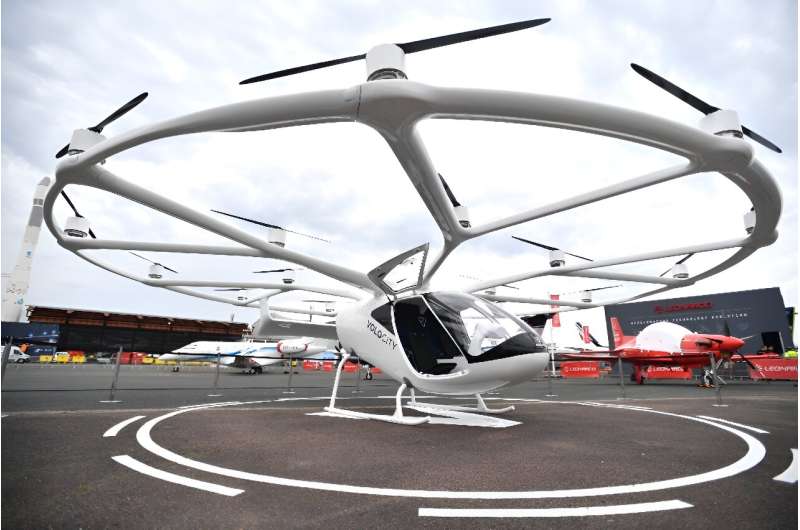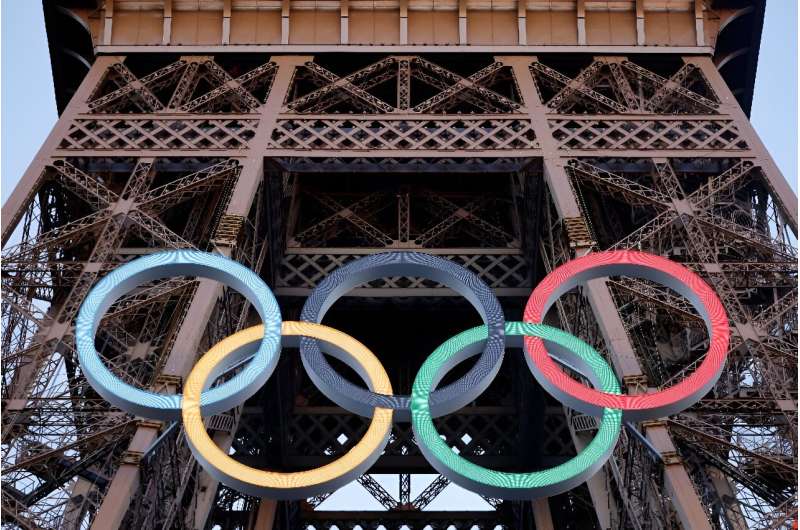
France's transport minister said Wednesday that so-called "flying taxis"—large futuristic drones capable of transporting several people—would be authorized for use on an experimental basis during the Paris Olympics.
"We are going to experiment with this world-first during the Olympic Games. It's a technological advance that could be of use," Patrice Vergriete told Le Parisien newspaper.
But he also dashed hopes of sports fans hoping to buzz over the City of Light to reach their destinations in July and August, saying that the terms of the authorization would be limited and not include use by the general public.
"I'm not a fan of the name 'flying taxi' as it's been called," he added before explaining the possible roles for the 18-rotor vehicles which resemble small helicopters.
He said they "could be useful as a future ambulance, so let's be pragmatic. Let's analyze the impact and do a cost-benefit analysis.
"There'll be some test flights during the Games. If we see that they're not effective and that they make too much noise, then we'll draw conclusions," Vergriete added.
"Flying taxis" were once a staple of science-fiction movies but are now a reality—in theory.
Manufacturers have run into regulatory and safety barriers around the world that have prevented their roll-out.
'Greenwashing'?
Germany manufacturer Volocopter has been conducting test flights in the Paris region for several years of its two-seater VoloCity and has lobbied hard for authorization from European authorities in time for the Olympics.

The company has partnered with French airport operator ADP, the capital's metro and bus operator RATP, and the Paris regional government.
Four landing and take-off zones have been built around the capital, including at the Charles de Gaulle airport and the smaller Le Bourget airfield, in addition to a new floating platform on the river Seine in western Paris.
In addition to regulatory hurdles, it is yet to convince French authorities of its environmental credentials or utility as a battery-powered low-carbon transport solution.
Local councilors in Paris have voted unanimously against the concept.
"It's greenwashing in its purest form, a mode of transport created for the ultra-rich in a hurry because there's only one space for a passenger," deputy mayor of Paris, Dan Lert, from the French Greens party told AFP.
A petition demanding a ban has garnered around 15,000 signatures and a collective named "Flying Taxis, No Thanks" has called for a demonstration on June 21.
Volocopter says it has invested around 600 million euros ($650 million) and the group came close to bankruptcy earlier this year.
It is aiming for certification from the European Union Aviation Safety Agency (EASA) "in the autumn", the company said last month.
With a maximum airspeed of 110 kilometers (68 miles) per hour, the VoloCity has room for a pilot and a passenger.
The Paris Olympics run from July 26-August 11, followed by the Paralympics from August 28-September 8.
© 2024 AFP
Citation: 'Flying taxis' to be tested during Paris Olympics: Minister (2024, June 12) retrieved 12 June 2024 from https://techxplore.com/news/2024-06-flying-taxis-paris-olympics-minister.html
This document is subject to copyright. Apart from any fair dealing for the purpose of private study or research, no part may be reproduced without the written permission. The content is provided for information purposes only.
